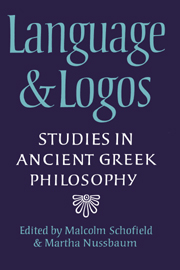Book contents
- Frontmatter
- Contents
- Preface
- Introduction
- 1 Heraclitus' conceptions of flux, fire and material persistence
- 2 Epistemology and meaning in Heraclitus
- 3 The dénouement of the Cratylus
- 4 Cratylus' theory of names and its refutation
- 5 Knowledge and language: the Theaetetus and the Cratylus
- 6 Falsehood and not-being in Plato's Sophist
- 7 Forms and dialectic in the second half of the Parmenides
- 8 Aristotle and the more accurate arguments
- 9 Aristotle on the principles of change in Physics I
- 10 Aristotle on natural teleology
- 11 Accidental unities
- 12 Aristotle's concept of signification
- 13 Saving Aristotle's appearances
- 14 Myths about non-propositional thought
- 15 Gods and heaps
- Bibliography of the publications of G. E. L. Owen
- Index locorum
- Index of names
12 - Aristotle's concept of signification
Published online by Cambridge University Press: 09 October 2009
- Frontmatter
- Contents
- Preface
- Introduction
- 1 Heraclitus' conceptions of flux, fire and material persistence
- 2 Epistemology and meaning in Heraclitus
- 3 The dénouement of the Cratylus
- 4 Cratylus' theory of names and its refutation
- 5 Knowledge and language: the Theaetetus and the Cratylus
- 6 Falsehood and not-being in Plato's Sophist
- 7 Forms and dialectic in the second half of the Parmenides
- 8 Aristotle and the more accurate arguments
- 9 Aristotle on the principles of change in Physics I
- 10 Aristotle on natural teleology
- 11 Accidental unities
- 12 Aristotle's concept of signification
- 13 Saving Aristotle's appearances
- 14 Myths about non-propositional thought
- 15 Gods and heaps
- Bibliography of the publications of G. E. L. Owen
- Index locorum
- Index of names
Summary
Meaning and signification
Professor Owen has taught us to attend to Aristotle's, no less than to Plato's, views on the relation between language and reality. Some of his work is the distinguished result of his attention to these views. In ‘Logic and Metaphysics’ and ‘Aristotle on the Snares of Ontology’ he has argued that Aristotle's views on the proper way to inquire into Being are influenced by his views on the irreducibly different senses of ‘being’. In ‘Tithenai ta Phainomena’ he has shown how Aristotle's questions ‘What is time?’, ‘What is place?’, ‘Does anyone ever act incontinently?’ and so on are approached by methods and arguments different from those of empirical science: ‘By such arguments the Physics ranks itself not with physics in our sense of the word, but with philosophy. Its data are for the most part the materials not of natural history but of dialectic, and its problems are accordingly not questions of empirical fact but conceptual puzzles.’
This account of Aristotle's results reflects a clear and influential picture of his questions and his aims. Aristotle asks the Socratic ‘What is it?’ question to find out what a word means, to give an analysis of the concept associated with the word; he wants to set out the meaning that competent speakers implicitly grasp but cannot always state in clear, paradox-free terms. Sometimes he denies that there is just one answer to the Socratic question, because the word is homonymous; and then he means that it has more than one sense.
- Type
- Chapter
- Information
- Language and LogosStudies in Ancient Greek Philosophy Presented to G. E. L. Owen, pp. 241 - 266Publisher: Cambridge University PressPrint publication year: 1982
- 9
- Cited by



